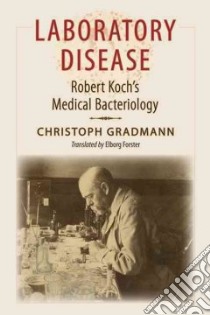Laboratory Disease - 9780801893131
Un libro in lingua di Christoph Gradmann Forster Elborg (TRN) edito da Johns Hopkins Univ Pr, 2009
- € 37.40
- Il prezzo è variabile in funzione del cambio della valuta d’origine
The German physician and scientist Robert Koch (1843-1910) was pioneer in identification of pathogens, winning the Nobel Prize for his work on tuberculosis. Gradmann (history of medicine, University of Oslo) presents a biography of Koch's scientific career and the development of the field of bacteriology. He gives a brief outline of Koch's life, which has been the subject of other biographies. The real topic, however, is the work and the creation of scientific methods that are still employed today. Each of the four chapters stands alone as Gradmann investigates different aspects of bacteriology. He begins with Koch's early interest in botany and the relationship of methods of plant studies to later study of pathogens. The second section is on the work done on the tuberculosis pathogen and the beginnings of what would become Koch's Postulates. Following this is a discussion of the transfer of information from the laboratory to the hospital. The attitude of doctors toward the scientists and the debate over the rights of patients to know what medication they are getting is the focus. The final section shows how Koch's passion for travel inclined him to study disease in the field, in epidemics of cholera and sleeping sickness. The study is a fascinating look behind the scenes of the scientific life of a leader in the new area of bacteriology, showing how great discoveries are made and how they are influenced by personal preferences and rivalries. The translation from Norwegian by Forster, is excellent. Annotation ©2009 Book News, Inc., Portland, OR (booknews.com)
Informazioni bibliografiche
- Titolo del Libro in lingua: Laboratory Disease
- Sottotitolo: Robert Koch's Medical Bacteriology
- Lingua: English
- Autori : Christoph Gradmann Forster Elborg (TRN)
- Editore: Johns Hopkins Univ Pr
- Collana: Johns Hopkins Univ Pr (Hardcover)
- Data di Pubblicazione: 11 Settembre '09
- Genere: BIOGRAPHY and AUTOBIOGRAPHY
- Argomenti : Medical bacteriology History Bacteriology history Germany History, 19th Century Germany
- Pagine: 318
- Dimensioni mm: 228 x 152 x 19
- ISBN-10: 0801893135
- EAN-13: 9780801893131


